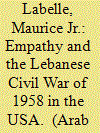|
|
|
Sort Order |
|
|
|
Items / Page
|
|
|
|
|
|
|
| Srl | Item |
| 1 |
ID:
167546


|
|
|
|
|
| Summary/Abstract |
The article aims at reading Bahaa Taher's Wāḥat al-Ghuūb (Sunset Oasis) through Ernst Bloch's notion of the simultaneity of the nonsimultaneous (Gleichzeitigkeit des Ungleichzeitigen), which foregrounds the existence of a multilayered temporality in the now, together with its inherent contradictions. By deploying the hermeneutical capacity of the simultaneity of the nonsimultaneous, the article shows how Taher highlights the condition of a nation in crisis, through its social and cultural strata that are out of sync. The simultaneity of the nonsimultaneous is, therefore, the underlying logic of the content as well as a form of expression. By analyzing the multilayered temporality, the article argues that Bahaa Taher introduces a multivoiced dialectic, that brings all contradictions to consciousness without mastering and controlling them under a grand narrative.
|
|
|
|
|
|
|
|
|
|
|
|
|
|
|
|
| 2 |
ID:
167548


|
|
|
|
|
| Summary/Abstract |
This article examines the role that empathy played during the US intervention in the Lebanese civil war of 1958, also known as Operation Blue Bat. Through deep readings of public texts, it explores how a minority of Americans empathized with Lebanese opponents of President Camille Chamoun. After the arrival of US forces, Lebanese anti-Chamounists made their voices heard and feeling felt in the USA via global information providers, enacting cultural interventions. Lebanese dissent was headline news, engendering empathetic processes that reoriented US ways of feeling, thinking, and acting. By using empathy as a point of entry into historical intercultural relations, this article unearths how genuine transnational understandings were socially formed during a moment of conflict. Ultimately, it argues that a focus on empathy gives foreign relations scholars an avenue that eschews nefarious Orientalist binaries and their powers in the process.
|
|
|
|
|
|
|
|
|
|
|
|
|
|
|
|
| 3 |
ID:
167547


|
|
|
|
|
| Summary/Abstract |
Philip K. Hitti was the first scholar to study Arab-American immigration to the United States. Highly influential during the twentieth century, his ideas have lost much of their appeal to current interpreters of the early diaspora of Arab-Americans called Syrians at the time. This article revisits Hitti's thought, focusing on the issues of Palestine and Arab identity. Using primary source material from Hitti's archived papers, plus multiple secondary sources, I argue that Hitti maintained consistency, both in his advocacy of the general Arab stance opposing a Jewish homeland in Palestine, and in his construction of Arab identity as different from Syrian identity. On Palestine, Hitti clashed with Albert Einstein, in public discourse and in an acerbic private exchange of correspondence. On Arab identity, Hitti held firm to a strict interpretation, distinguishing Syrians, conceptualized as Christian, from Arabs, conceptualized as Islamic.
|
|
|
|
|
|
|
|
|
|
|
|
|
|
|
|
|
|
|
|
|